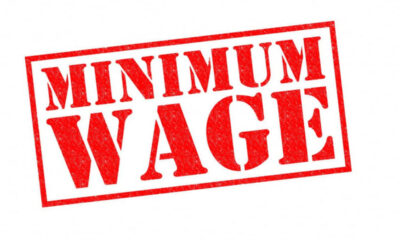Oil & Energy
Oil Theft, Not Nigeria’s Problem – LG Boss
Contrary to concerns
expressed over oil theft as one of the major problems militating against the economy of Nigeria, the chairman of Okrika Local Government Area, Hon Tamuno Williams, says not oil theft but corruption that is bedeviling the nation’s economy.
The council boss who spoke to journalists at a public function in Okrika local government area yesterday wondered why so much fuss was being made about oil theft when the nation’s economy was being milked unchecked by those responsible.
He said since the militants were given amnesty and awarded contracts to secure oil pipes, the problem of oil theft become dead.
“Where have you heard pipelines being bust in the Niger Delta region for sometimes now, let’s not deceive ourselves, it is corruption high places:, he said.
He pointed at the billions of dollar fraud and accusations being made at the federal level and noted that it was only when proper investigations were made and those who stole the money exposed and punished that the economy would be better.
According to him, the said billions of dollars if put in our refineries could revamp them and urged those making much fuss and about oil theft to be realistic.
He expressed regret that in spite of rich oil endowment in the nation, we still import fuel from Gabon and other countries which out to import from us.
The council boss said people occupying public offices should be accountable and transparent for the growth of the nation.
“Frankly speaking, I don’t think our problem for now is oil theft as some persons are saying but I believe that when corruption is checked in proper places and those stealing our billions of dollars are investigated and dealt with, we shall be better off”, the council boss insisted.
Chris Oluoh
Oil & Energy
FG Explains Sulphur Content Review In Diesel Production
The Federal Government has offered explanation with regard to recent changes to fuel sulphur content standards for diesel.
The Government said the change was part of a regional harmonisation effort, not a relaxation of regulations for local refineries.
The Chief Executive, Nigerian Midstream and Downstream Petroleum Regulatory Authority (NMDPRA), Farouk Ahmed, told newsmen that the move was only adhering to a 2020 decision by the Economic Community of West African States (ECOWAS) which mandated a gradual shift to cleaner fuels across the region.
Ahmed said the new limits comply with the decision by ECOWAS that mandated stricter fuel specifications, with enforcement starting in January 2021 for non-ECOWAS imports and January 2025 for ECOWAS refineries.
“We are merely implementing the ECOWAS decision adopted in 2020. So, a local refinery with a 650 ppm sulphur in its product is permissible and safe under the ECOWAS rule until January next year where a uniform standard would apply to both the locally refined and imported products outside West Africa”, Ahmed said.
He said importers were notified of the progressive reduction in allowable sulphur content, reaching 200 ppm this month from 300 ppm in February, well before the giant Dangote refinery began supplying diesel.
Recall that an S&P Global report, last week, noted a significant shift in the West African fuel market after Nigeria altered its maximum diesel sulphur content from 200 parts per million (ppm) to around 650 ppm, sparking concerns it might be lowering its standards to accommodate domestically produced diesel which exceeds the 200 ppm cap.
High sulphur content in fuels can damage engines and contribute to air pollution. Nevertheless, the ECOWAS rule currently allows locally produced fuel to have a higher sulphur content until January 2025.
At that point, a uniform standard of below 5 ppm will apply to both domestic refining and imports from outside West Africa.
Importers were previously permitted to bring in diesel with a sulphur content between 1,500 ppm and 3,000 ppm.
It would be noted that the shift to cleaner fuels aligns with global environmental efforts and ensures a level playing field for regional refiners.
Oil & Energy
PHED Implements April 2024 Supplementary Order To MYTO
The Port Harcourt Electricity Distribution (PHED) plc says it has commenced implementation of the April 2024 Supplementary Order to the MYTO in its franchise area while assuring customers of improved service delivery.
The Supplementary order, which took effect on April 3, 2024, emphasizes provisions of the MYTO applicable to customers on the Band A segment taking into consideration other favorable obligations by the service provider to Band A customers.
The Head, Corporate Communications of the company, Olubukola Ilvebare, revealed that under the new tariff regime, customers on Band A Feeders who typically receive a minimum supply of power for 20hours per day, would now be obliged to pay N225/kwh.
“According to the Order, this new tariff is modeled to cushion the effects of recent shifts in key economic indices such as inflation rates, foreign exchange rates, gas prices, as well as enable improved delivery of other responsibilities across the value chain which impact operational efficiencies and ability to reliably supply power to esteemed customers.
“PHED assures Band A customers of full compliance with the objectives of the new tariff order”, he stated.
Ilvebare also said the management team was committed to delivering of optimal and quality services in this cost reflective dispensation.
The PHED further informed its esteemed customers on the other service Bands of B, C D & E, that their tariff remains unchanged, adding that the recently implemented supplementary order was only APPLICABLE to customers on Band A Feeders.
Oil & Energy
PH Refinery: NNPCL Signs Agreement For 100,000bpd-Capacity Facility Construction

The Nigerian National Petroleum Company Ltd (NNPCL) has announced the signing of an agreement with African Refinery for a share subscription agreement with Port-Harcourt Refinery.
The agreement would see the co-location of a 100,000bpd refinery within the Port-Harcourt Refinery complex.
This was disclosed in a press statement on the company’s official X handle detailing the nitty-gritty of the deal.
According to the NNPCL, the new refinery, when operational, would produce PMS, AGO, ATK, LPG for both the local and international markets.
It stated, “NNPC Limited’s moves to boost local refining capacity witnessed a boost today with the signing of share subscription agreement between NNPC Limited and African Refinery Port Harcourt Limited for the co-location of a 100,000bpd capacity refinery within the PHRC complex.
“The signing of the agreement is a significant step towards setting in motion the process of building a new refinery which, when fully operational, will supply PMS, AGO, ATK, LPG, and other petroleum products to the local and international markets and provide employment opportunities for Nigerians.
By: Lady Godknows Ogbulu
-

 News3 days ago
News3 days ago82nd Birthday: Odu Eulogises King Dandeson Jaja
-

 Politics3 days ago
Politics3 days agoJonathan Mourns, Ex-Senate Spokesperson, Ayogu Eze
-

 Rivers3 days ago
Rivers3 days agoFour Dead, 70 Vehicles Burnt In Fuel Tanker Explosion In Rivers
-

 Education3 days ago
Education3 days agoDon Seeks 20%Increased Budget Allocation To Education
-

 Business3 days ago
Business3 days agoAXA Mansard Backs Female-Owned MSMEs With N1.4m Grant
-

 Editorial3 days ago
Editorial3 days agoTowards Minimum Wage Implementation
-

 Nation3 days ago
Nation3 days agoSDP National Chairman Lauds FG’s Efforts To Tackle Insecurity
-

 Breaking News3 days ago
Breaking News3 days agoTanker Inferno: We’re Saddened By Extent Of Carnage -Fubara

